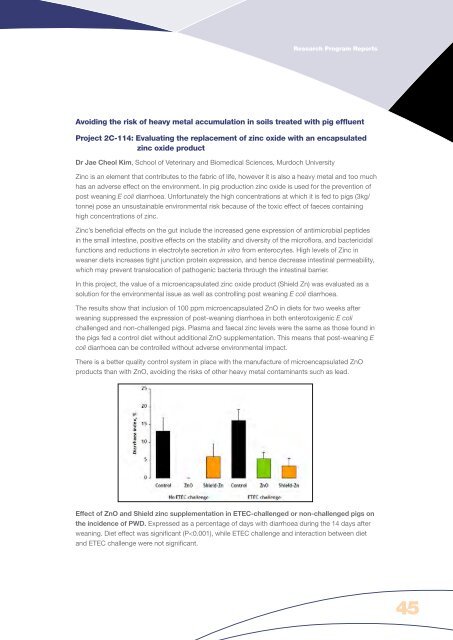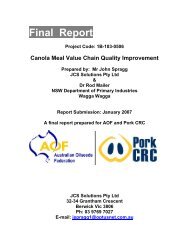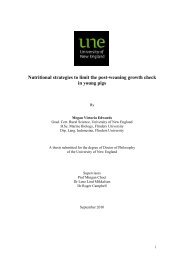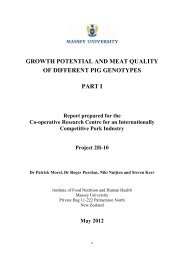annual report 09/10 - Apri.com.au
annual report 09/10 - Apri.com.au
annual report 09/10 - Apri.com.au
Create successful ePaper yourself
Turn your PDF publications into a flip-book with our unique Google optimized e-Paper software.
Research Program ReportsAvoiding the risk of heavy metal accumulation in soils treated with pig effluentProject 2C-114: Evaluating the replacement of zinc oxide with an encapsulatedzinc oxide productDr Jae Cheol Kim, School of Veterinary and Biomedical Sciences, Murdoch UniversityZinc is an element that contributes to the fabric of life, however it is also a heavy metal and too muchhas an adverse effect on the environment. In pig production zinc oxide is used for the prevention ofpost weaning E coli diarrhoea. Unfortunately the high concentrations at which it is fed to pigs (3kg/tonne) pose an unsustainable environmental risk bec<strong>au</strong>se of the toxic effect of faeces containinghigh concentrations of zinc.Zinc’s beneficial effects on the gut include the increased gene expression of antimicrobial peptidesin the small intestine, positive effects on the stability and diversity of the microflora, and bactericidalfunctions and reductions in electrolyte secretion in vitro from enterocytes. High levels of Zinc inweaner diets increases tight junction protein expression, and hence decrease intestinal permeability,which may prevent translocation of pathogenic bacteria through the intestinal barrier.In this project, the value of a microencapsulated zinc oxide product (Shield Zn) was evaluated as asolution for the environmental issue as well as controlling post weaning E coli diarrhoea.The results show that inclusion of <strong>10</strong>0 ppm microencapsulated ZnO in diets for two weeks afterweaning suppressed the expression of post-weaning diarrhoea in both enterotoxigenic E colichallenged and non-challenged pigs. Plasma and faecal zinc levels were the same as those found inthe pigs fed a control diet without additional ZnO supplementation. This means that post-weaning Ecoli diarrhoea can be controlled without adverse environmental impact.There is a better quality control system in place with the manufacture of microencapsulated ZnOproducts than with ZnO, avoiding the risks of other heavy metal contaminants such as lead.Figure XXX – Effect of ZnO and Shield zinc supplementation in ETEC-challenged or nonchallengedof ZnO pigs and on Shield the incidence zinc supplementation of PWD in ETEC-challenged or non-challenged pigs onEffectthe Expressed incidence as of a percentage PWD. Expressed of days with as a diarrhoea percentage during of the days 14 with days diarrhoea after weaning. during Diet the effect 14 days was aftersignificant (P





